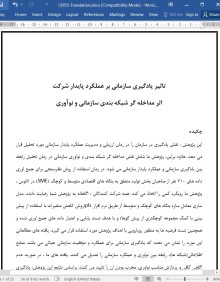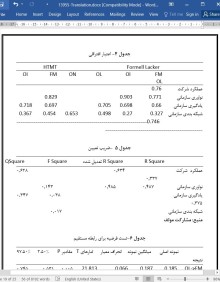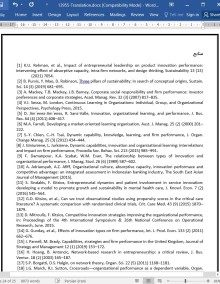
دانلود مقاله تاثیر یادگیری سازمانی بر عملکرد پایدار شرکت
چکیده
این پژوهش ، نقش یادگیری در سازمان را در زمان ارزیابی و مدیریت عملکرد پایدار سازمانی مورد تحلیل قرار می دهد. علاوه براین، پژوهش ما شامل نقش مداخله گر شبکه بندی و نواوری سازمانی در زمان تحلیل رابطه بین یادگیری سازمانی و عملکرد پایدار سازمانی می شود. در زمان استفاده از روش نظرسنجی برای جمع اوری داده های 710 نفر از صاحبان بخش تولید متعلق به بنگاه های اقتصادی متوسط و کوچک (SME) در لائوس ، پژوهش ما رویکرد کمی را اتخاذ می کند. همه شرکت کنندگان ، اگاهانه به پژوهش شما رضایت دادند. مدل سازی معادل سازه بنگاه های کوچک و متوسط از طریق نرم افزار pls(روش کاهش متغیرات با استفاده از پیش بینی با کمک مجموعه کوچکتری از پیش گوها) و با هدف تست پایایی و اعتبار داده های جمع اوری شده و همچنین تست فرضیه ها به منظور رویارویی با اهداف پژوهش مورد استفاده قرار می گیرد. یافته های مطالعاتی این مورد را نشان می دهند که یادگیری سازمانی برای عملکرد و موفقیت سازمانی حیاتی می باشد. منابع اطلاعاتی(شبکه ها)، رابطه بین نواوری و عملکرد سازمانی را تعدیل می کنند. یافته های ما ، در صورت عدم اگاهی کافی و پردازش مناسب نواوری، مخرب بودن ان را تایید می کنند. براساس نتایج این پژوهش، یادگیری سازمانی برای عملکرد پایدار سازمانی حیاتی است. از دیدگاهی کاملا متفاوت، پژوهش اخیر از طریق بررسی عملکرد پایدار سازمانی، به مجموعه دانش و اگاهی کمک می کند.
1 مقدمه
دستیابی به عملکرد پایدار سازمانی ، هدف اصلی هر سازمان می باشد. دستیابی به عملکرد، بستگی به شاخص های حیاتی عملکرد دارد که به عنوان اقدامات هدفمند ، چالش برانگیز هستند]1[ . امروزه، عامل پایداری به عنوان یک عنصر حیاتی در جهت کسب امتیاز رقابتی و بهبود ظرفیت نواوری سازمانها مورد بررسی قرار می گیرد.[2]. دهه ها است که مدیریت و حفظ عملکرد سازمانی ، یکی از مسائل بسیار مهم مطالعات سازمانی می باشد. مولفین مختلف به تشریح متفاوت عملکرد سازمانی در ادبیات نمایشی عملکرد پرداختند[3]. اگر چه مولفین تشریحات متفاوت را پیشنهاد دادند اما بیشتر انها با این مورد موافق بودند که این عملکرد می تواند از طریق چگونگی کارایی و کارامدی شرکت در ایجاد بیشترین منابع کمینه موجود در شرایط کنونی تعیین شود. نتایج سازمانی در هردو معیارهای مالی و غیر مالی مورد ارزیابی قرار گرفت. شاخص های عملکرد مالی شامل موارد ذیل می شوند: بازده سرمایه گذاری، بازده حقوق صاحبان سهام، حجم فروش، درصد سود از فروش خالص و نسبت سود به درامد. در مقایسه، شاخص های عملکرد غیر مالی شامل مواردی همانند مشتری داخلی، رضایت کارمند، رضایت مشتری خارجی، عملکرد محیطی و عملکرد اجتماعی می شوند.
عملکرد پایدار سازمانی بستگی به قابلیت سازمانی در جهت تعامل با چالش های محیط داخلی و خارجی دارد. اکثر تحقیقات موجود، ارتباط با محیط داخلی سازمان و عوامل مربوطه را مورد توجه قرار می دهند. تعداد زیادی از محققان بر اهمیت تقویت عوامل سازمانی داخلی با هدف ارتقا عملکرد تاکید می کنند. پژوهشگران بر این باورند که عوامل خارجی اغلب فراتر از کنترل سازمان می باشند همچنین مدیریت یا اثر گذاری انها نیز فراتر از منبع کنترل انها است. بنابراین، این پژوهش شامل هر دو عوامل داخلی و خارجی می شود، برای نمونه: نواوری، یادگیری در شرکت، یادگیری از محیط خارجی و شبکه بندی که می تواند بر عملکرد شرکت تاثیر گذار باشند.
7. نتیجه گیری
ارزیابی، مدیریت و حفظ عملکرد سازمانی پیچیده می باشد و این مورد یک مشکل دراز مدت است که هنوز کاملا از طریق محققان و مدیریت سازمانها شناسایی نشده است. مطالعه در زمینه پژوهش اخیر به بررسی نواوری سازمانی به عنوان یک متغیر میانجی بین یادگیری سازمانی و عملکرد شرکت پرداخته است. این یادگیری سازمانی در صورت عدم تبدیل به شیوه ها و عملکردها، نمی تواند به سازمانها در جهت دستیابی به عملکرد بالا کمک کند. عملکرد سازمانی نقش تعیین کننده ای در موفقیت کسب و کار دارد. عوامل زیادی از قبیل سهام بازار، حجم فروشها و عوامل داخلی شامل ارتقاهای سیستم سازمانی می شوند.
رویکردهای متفاوتی در جهت ارزیابی عملکرد سازمانی وجود دارند. نواوری در سطح سازمانی، شامل نواوری از لحاظ توسعه محصول/خدمات جدید، نواوری بازاریابی و سازمانی، توسعه دانش، ظرفیت های خلاق و افزایش عملکرد مبدا از طریق تمایز نواوری، از مواردی هستند که سازمانهای اندکی انها را قبول کرده و نسبت به انها متعهد می باشند. پژوهش اخیر به ارزیابی عملکرد سازمانی از طریق یادگیری سازمانی، نواوری و شبکه بندی می پردازد. یافته پژوهش اخیر بر این مورد اشاره دارد که یادگیری سازمانی برای عملکرد سازمانی ضروری است. یادگیری به واسطه شبکه های خارجی و اجرای ان در داخل شبکه سازمان نواوری منتهی به عملکرد بهتر سازمان می شود. پژوهش اخیر از نظر تجربی، نقش یادگیری اجرایی شده در شبکه های خارجی را تست می کند، در این شبکه ها، یادگیری نواوری در داخل شبکه های سازمانی سبب تسهیل عملکرد بهتر می شود. پژوهش اخیر، نقش بنگاه های تولیدی متوسط و کوچک را در لائوس برجسته می کند زیرا این بنگاه ها به طرز قابل توجهی در تولید ناخالص ملی لائوس مشارکت دارند. محققان می توانند این مطالعه را با مشخصه های مشابه در سطح وسیع تا دیگر کشورهای توسعه یافته، گسترش دهند.
Abstract
This research has analyzed the role of learning in an organization while measuring and managing sustainable organizational performance. Furthermore, our research has also included the intervening role of organizational networking and organizational innovation while analyzing the relationship between organizational learning and sustainable organizational performance. Our research has adopted a quantitative approach while using the survey method to collect data from 710 owners of the manufacturing sector belonging to the Small and Medium Enterprises SMEs operating in Laos. Informed consent was obtained from all participants for your research. Structure equation modeling SEM was used through partial least square PLS software to test the collected data's reliability and validity and test the hypothesis to meet the research objectives. The study's findings reveal that organizational learning is vital to organizational performance and success. Information sources (networks) moderate the relationship between innovation and organizational performance. Our findings confirm that innovation is disruptive if it is not well-informed and well-processed. The research concludes that organizational learning is very vital for sustainable organizational performance. The current research contributes to the body of knowledge by examining sustainable organizational performance from an entirely different perspective.
1. Introduction
Achieving sustainable organizational performance is the prime objective of every organization. Achieving performance depends upon the critical performance indicators referred to as objective measures and is considered problematic [1]. Sustainability nowadays is considered a vital element in gaining a competitive advantage and improving the innovative capacity of organizations [2]. Managing and sustaining organizational performance has been one of the utmost important issues of organizational studies for decades. Different authors define organizational performance differently in performance literature [3]. Although the authors suggest different definitions, most agree that performance can be determined by how efficiently and effectively a firm makes the most out of the least resources in given circumstances. Organizational outcomes are being measured on both the financial and non-financial yardsticks. The financial performance indicators are; return on investment, return on equity, sales volume, profit margins, and profit-to-revenue ratios. In contrast, the non-financial indicators of performance are internal customer/employee satisfaction, external customer satisfaction, environmental performance, and social performance.
Sustainable organizational performance depends upon the organizational ability to coop with the challenges of the internal and external environment. Most of the available research has focused on dealing with the internal environment of the organization and its pertinent factors. Many researchers have highlighted the importance of strengthening internal organizational factors to improve performance. Researchers believe that as the external factors are often beyond the organization’s control, managing or influencing them is beyond its locus of control. Hence, this research caters to internal and external factors, i.e., innovation, learning within the firm, learning from the external environment, and networking that can influence the firm’s performance.
7. Conclusion
Measuring, managing, and sustaining organizational performance is complex, and this has been a long-lasting issue yet to be fully explored by researchers and the management of organizations. The current research study has taken organizational innovation as a mediating variable between organizational learning and firm performance. If not converted into innovative practices and operations, organizational learning cannot help organizations achieve high performance. Organizational performance plays a decisive role in business success. Many factors affect organizational performance, such as market share, sales volume, profits, and internal factors, including organizational system improvements.
There are different approaches to measuring organizational performance. Innovation at the organizational level, including innovation in terms of new product/service development, organizational and marketing innovation, knowledge development, creative capabilities, and enhancing origination performance through innovation by differentiation, are a few organizations undertaking this. Current research measures organizational performance through organizational learning through innovation and networking. The current research finding suggests that organizational learning is essential to organizational performance. Learning from external networks and implementing that learning within the organizational network in innovation leads an organization toward better performance. Current research empirically tested the role of learning from external networks and implemented that learning in innovation within organizational networks facilitates better performance. Current research highlights the role of manufacturing SMEs in Laos as these SMEs significantly contribute to Laos’s GDP. Researchers can extend the study to other developing countries most likely share similar characteristics.
H1: Organizational learning positively influences the organizational performance.
H2: Organizational learning impacts the organization’s innovation.
H3: Organizational innovation impacts the organizational performance.
H4: Innovation mediates the relationship between organizational learning and firm performance.
H4: organizational networking moderates the relationship between organizational innovation and firm performance.
H1: یادگیری سازمانی ، تاثیر مثبتی بر عملکرد سازمانی خواهد داشت.
H2: یادگیری سازمانی بر نواوری سازمانی اثر می گذارد.
H3: نواوری سازمانی بر عملکرد سازمانی اثر می گذارد.
H4: نواوری رابطه میانجی بین یادگیری سازمانی و عملکرد شرکت می باشد.
H4: شبکه بندی سازمانی سبب تعدیل رابطه بین نواوری سازمانی و عملکرد شرکت می شود.
چکیده
1 مقدمه
1.1 شکاف تحقیقاتی
2. بررسی ادبیات و توسعه فرضیه
2.1. یادگیری سازمانی و عملکرد شرکت
2.2. یادگیری سازمانی، نواوری و عملکرد شرکت
2.3 شبکه بندی سازمانی ، نواوری و عملکرد پایدار شرکت
.3 چارچوب نظری
4. مطالب و روشها
4.1. جمعیت و نمونه گیری
4.2. جمع اوری داده ها
5. نتایج
5.1 تست بهنجاری
5.2. مدل اندازه گیری
5.3 دل سازه
5.4. تست فرضیه
6. بحث
6.1. مفاهیم
6.2. محدودیت ها و پژوهش اینده
7. نتیجه گیری
منابع
Abstract
1. Introduction
1.1. Research gap
2. Literature review and hypothesis development
2.1. Organizational learning and firm performance
2.2. Organizational learning, innovation, and firm's performance
2.3. Organizational networking, innovation, and sustainable firm performance
3. Theoretical Framework
4. Materials and methods
4.1. Population and sampling
4.2. Data collection
5. Results
5.1. Normality test
5.2. Measurement model
5.3. Structure model
5.4. Hypothesis testing
6. Discussion
6.1. Implications
6.2. Limitations and future research
7. Conclusion
Author contribution statement
Data availability statement
Declaration of competing interest
References
این محصول شامل پاورپوینت ترجمه نیز می باشد که پس از خرید قابل دانلود می باشد. پاورپوینت این مقاله حاوی 19 اسلاید و 6 فصل است. در صورت نیاز به ارائه مقاله در کنفرانس یا سمینار می توان از این فایل پاورپوینت استفاده کرد.
در این محصول، به همراه ترجمه کامل متن، یک فایل ورد ترجمه خلاصه نیز ارائه شده است. متن فارسی این مقاله در 7 صفحه (2100 کلمه) خلاصه شده و در داخل بسته قرار گرفته است.
علاوه بر ترجمه مقاله، یک فایل ورد نیز به این محصول اضافه شده است که در آن متن به صورت یک پاراگراف انگلیسی و یک پاراگراف فارسی درج شده است که باعث می شود به راحتی قادر به تشخیص ترجمه هر بخش از مقاله و مطالعه آن باشید. این فایل برای یادگیری و مطالعه همزمان متن انگلیسی و فارسی بسیار مفید می باشد.
بخش مهم دیگری از این محصول لغت نامه یا اصطلاحات تخصصی می باشد که در آن تعداد 50 عبارت و اصطلاح تخصصی استفاده شده در این مقاله در یک فایل اکسل جمع آوری شده است. در این فایل اصطلاحات انگلیسی (تک کلمه ای یا چند کلمه ای) در یک ستون و ترجمه آنها در ستون دیگر درج شده است که در صورت نیاز می توان به راحتی از این عبارات استفاده کرد.
- ترجمه فارسی مقاله با فرمت ورد (word) با قابلیت ویرایش و pdf بدون آرم سایت ای ترجمه
- پاورپوینت فارسی با فرمت pptx
- خلاصه فارسی با فرمت ورد (word)
- متن پاراگراف به پاراگراف انگلیسی و فارسی با فرمت ورد (word)
- اصطلاحات تخصصی با فرمت اکسل



